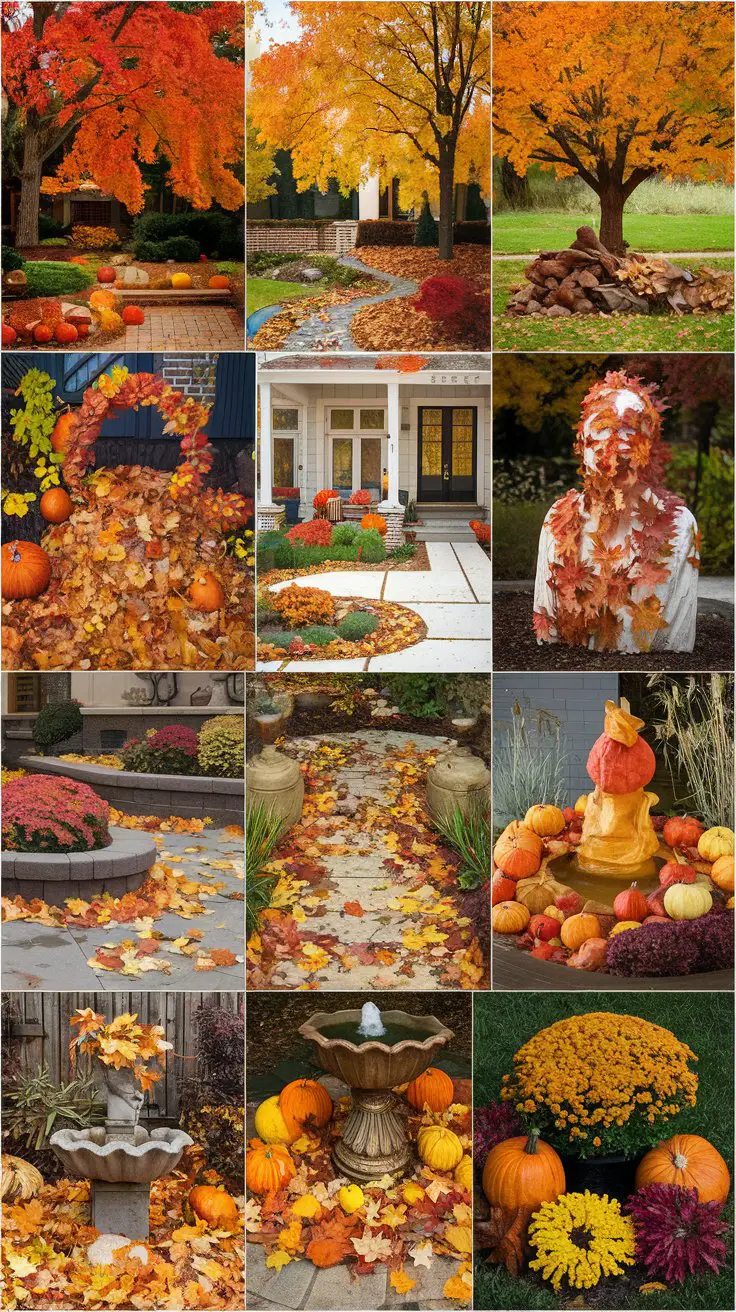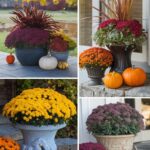The Joy of Fall
Autumn, the season that marks the transition from the blazing heat of summer to the cool embrace of winter, offers a unique opportunity to transform your front yard into a stunning seasonal display. The air is crisp, filled with the scent of fallen leaves and the promise of upcoming festivities. The landscape painted in hues of red, orange, and gold beckons homeowners to create a picturesque and inviting entrance to their abodes.
Crafting a Welcoming Ambiance
Creating a warm, inviting ambiance in your front yard is more than just an aesthetic endeavor. It gives you a chance to showcase the essence of fall, using well-chosen plants and decorations. A thoughtfully designed front yard can become the pride of the neighborhood, setting a festive tone and offering a warm welcome to every guest that approaches your doorstep.
Plant Choices
Your choice of plants can make or break your fall landscape design. Opt for a blend of textures, colors, and sizes to create a harmonious balance that reflects autumn’s rich tapestry.
Classic Fall Foliage
Maples
Maples are autumn exemplified. With their vibrant red and orange foliage, they become the focal point of any landscape. They are hardy, relatively low-maintenance, and their leaves are perfect for paving walkways with a natural carpet of warm colors.
Oaks
Oaks, with their robust stature and richly colored leaves, offer a sense of stability and grandeur. The variety in leaf color, from golden yellows to deep reds, makes oaks an excellent choice for adding depth to your landscape.
Dogwoods
Dogwoods transform beautifully in the fall, with leaves turning a mixture of red, purple, and pink. They’re smaller compared to maples and oaks, making them perfect for front yards where space might be limited.
Sumacs
Sumacs are often underestimated but provide a striking display with their bright red foliage and unique branching. Their autumn vibrance adds a dynamic character to your yard.
Vines (e.g., Virginia creeper, ivy)
Vines such as Virginia creeper and ivy can drape over fences, trellises, and walls, infusing vertical spaces with autumn hues. Their ability to cling and spread creates a lush, textured backdrop.
Grasses
Ornamental grasses like miscanthus and switchgrass become golden in the fall, adding a soft, flowing element to your garden. Their wispy plumes catch the light and the wind, adding movement and sculpture.
Like Us on Facebook!
Ferns
Ferns such as autumn fern bring a different texture with their feathery fronds. They transition to copper and gold tones, creating an elegant, under-story plant that complements more vibrant foliage.
Subscribe Us on YouTube!
Seasonal Touches
Nothing conveys the spirit of fall better than incorporating traditional seasonal elements and decorations into your landscape.
Pumpkins
Pumpkins, the quintessential symbol of fall, come in various shapes, sizes, and colors. Create groups of pumpkins around your yard, place them on steps, or use them as focal points in garden beds.
Gourds
Gourds add an eclectic charm with their vibrant colors and unique shapes. Scatter them among foliage or use them in arrangements to enhance the seasonal decor.
Apples
A basket of apples not only provides a burst of color but also a nod to autumn harvests. Place baskets strategically for a rustic yet inviting look.
Pinecones
Pinecones can be collected and used in a multitude of decorative ways, from simple scatterings to creating wreaths and garlands. They add texture and a woodland aesthetic.
Acorns
Acorns are small but mighty when it comes to decorating for fall. Use them in table centerpieces, scattering along walkways, or incorporating in planter arrangements.
Groundcovers
Groundcovers play a crucial role in maintaining your yard’s health while adding a layer of subtle beauty.
Creeping Thyme
Creeping thyme forms a carpet of green that turns slightly more muted in the fall. It’s an aromatic, low-growing groundcover that can fill gaps between stones and add fragrance.
Ivy
English ivy is a hardy groundcover that spreads quickly. It remains green through fall and winter, providing a lush backdrop to more colorful seasonal plants.
Sedum
Sedum, or stonecrop, is a succulent groundcover that changes color with the seasons. In fall, it often takes on a deep, reddish hue.
Vinca
Vinca, also known as periwinkle, adds purple-blue hues to your landscape. It’s a vigorous groundcover with glossy leaves that provide year-round ground coverage.
Flowering Shrubs
Flowering shrubs offer multi-season interest, providing blooms in spring and summer, and striking foliage in autumn.
Hydrangeas
Hydrangeas can dazzle with their large flower clusters, which change color as the seasons shift. In fall, their blooms often fade to muted pinks and greens, adding rustic charm.
Azaleas
While azaleas are known for their spring blooms, certain varieties showcase brilliant leaf colors in the fall, ranging from vibrant orange to deep crimson.
Roses
Some rose varieties continue to bloom well into the fall, providing ongoing color and a lovely fragrance. Their hips also add visual interest as they turn red or orange.
Flowering Quince
Flowering quince produces vibrant flowers that can appear again in fall, adding unexpected color. Their fruits are also ornamental and can be used in cooking.
Design Ideas
Once you’ve chosen your plants, consider how to arrange them to create a cohesive and stunning landscape.
Layered Looks
Creating a layered look involves combining tall trees, mid-height shrubs, and low-lying groundcovers. This tiered approach adds depth and dimension, making your front yard visually appealing from any angle.
Textural Contrast
Textural contrast refers to the interplay between smooth and rough textures. Mix delicate ferns with rugged bark trees, velvety flowering plants with coarse grasses, to create interest and intrigue.
Focal Points
A focal point acts as the central piece of your landscape, drawing attention and anchoring the design. This could be a large tree, a decorative sculpture, or an ornate fountain.
Symmetry vs. Asymmetry
Symmetrical designs offer a sense of order and formality, with mirrored plantings on either side of a central path or entryway. Asymmetrical designs, on the other hand, are dynamic and freeform, creating a more natural and relaxed look.
Themed Landscapes
Themed landscapes allow you to express your creativity and align your yard with your personal style or seasonal celebrations.
Rustic Charm
A rustic charm theme is characterized by natural elements, rough textures, and unrefined materials. Wood, stone, and metal combined with hearty, unpretentious plants create an inviting, homespun look.
Modern Minimalist
Modern minimalist landscapes utilize clean lines, simple color palettes, and understated plant selections. Think of sleek pots, geometric designs, and an emphasis on greenery over florals.
Halloween-Inspired
A Halloween-inspired landscape incorporates spooky elements like eerie lights, carved pumpkins, cobwebs, and dark foliage. Consider using plants with deep purple or black leaves to amplify the haunted atmosphere.
Thanksgiving-Themed
A Thanksgiving-themed landscape focuses on the harvest. Use bales of hay, corn stalks, and harvest vegetables. Warm lighting and earthy tones can amplify the festive vibe.
Color Schemes
Color plays a vital role in setting the tone of your fall landscape. Choose a color scheme that complements your home and personal taste.
Warm Tones
Warm tones, including oranges, reds, browns, and golds, evoke the spirit of fall. These colors bring warmth and coziness, reminiscent of bonfires and autumn leaves.
Cool Tones
Cool tones such as purples, blues, and greens provide a fresh contrast to traditional fall colors. When used thoughtfully, they can add a sophisticated and unexpected element to your landscape.
Monochromatic
A monochromatic color scheme focuses on variations of a single color. This approach can create a harmonious and unified look, especially if you choose a dominant fall color like orange or red.
Complementary
Complementary color schemes use colors opposite each other on the color wheel, such as orange and blue. This contrast can make each color appear more vibrant and dynamic.
Maintenance Tips
Maintaining your fall landscape ensures that it remains beautiful and healthy throughout the season. Regular care will protect your plants and keep your yard looking its best.
Raking
Rake fallen leaves regularly to prevent the buildup of mold and disease. Mulch the collected leaves to use as a nutrient-rich groundcover.
Pruning
Remove dead or damaged branches to promote healthy growth and improve the overall appearance of your plants. Proper pruning also helps maintain plant structure and reduces the risk of disease.
Fertilizing
Apply a balanced fertilizer to support plant health and prepare them for winter. Fertilizing in the fall helps establish strong root systems and ensures that plants have the nutrients they need.
Watering
Ensure that plants receive adequate moisture, especially during dry spells. Water deeply but less frequently to encourage root growth and reduce the risk of fungal diseases.
Pest and Disease Control
Monitor your plants for pests and diseases. Take appropriate measures such as natural remedies or organic pesticides to control any outbreaks before they become severe.
Additional Ideas
Beyond plants and traditional decorations, there are other creative ways to enhance your fall landscape.
Lighting
Add lanterns, fairy lights, or string lights to create a cozy atmosphere. Use solar-powered options for an eco-friendly approach and place them along pathways, in trees, or around seating areas.
Accessories
Incorporate decorative elements like doormats, wreaths, and seasonal garden flags. These small touches can make a significant impact on the overall look of your yard.
DIY Projects
Engage in DIY projects to create custom planters, bird feeders, or personalized decorations. These projects can reflect your style and add a unique touch to your landscape.




















